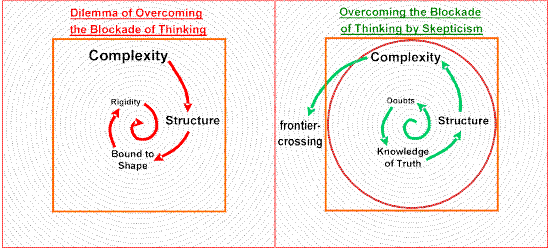Level 3:
THE ACCESS
» Structure
Science: Development
Complexity requires structure - structure means to be bound to shape - to be bound to shape restricts thinking.
Thinking enables sceptical doubts - doubts break structures - breaking structures enables change.
This dilemma has to be overcome. Scientific studies with the support of generally accepted methods might lead to respectable results but radical new concepts of the world containing a change of perspective cannot be expected by that way. According to the complexity world economy such innovative projects are needed urgently.
Forced by a deep discomfort with the actual situation of a system chaos has to be generated firstly. Therefore all relations which are accepted as true have to be considered as false. A system has to be destroyed in one's thoughts by fractionizing it to its atomistic elements. Naiviety linked with broad education and playing around linked with appropriate seriousness are helpful to reallocate the emerged chaos as long as an order can be recognized.
The precondition for that is patience that means the readiness to accept confusion and intuition that means the ability to identify structures in the chaos. The use of methods is then helpful and necessary to overcome the restrictions of our limited minds concerning the design of complex systems. This is the way to specify foreseen structures and to analyse feedback processes. In the case the result is insufficient you have to start again as alleged structures might be illusions.
The combination of facts by using techniques of creativity might be interesting but totally insufficient to change the perspectives because the sum of what is known can only lead to something else which is already known. It is also unlikely to reach news horizons by following aims and objectives as the apprehension of the solution narrows the mind.
An additional requirement to design systems is being able to think interdisciplinary which enables to identify similar structures in different systems. Furthermore the feedback processes between theory and practice show that theory is the best preparation for practice and that practice is the best preparation for theory. Finally decision makers who pretend to act in favour of the social welfare should know the sorrows and pains of the common people by their own experience.
The arise of characters who are able to create future-oriented world views is in deed heavily obstructed by the focus on practical experience and short-term success as well as by the preference of material interests in knowledge gaining and the hidden introduction of social criteria for the determination of our so called "elites".
Alternatives to deal with complexity










